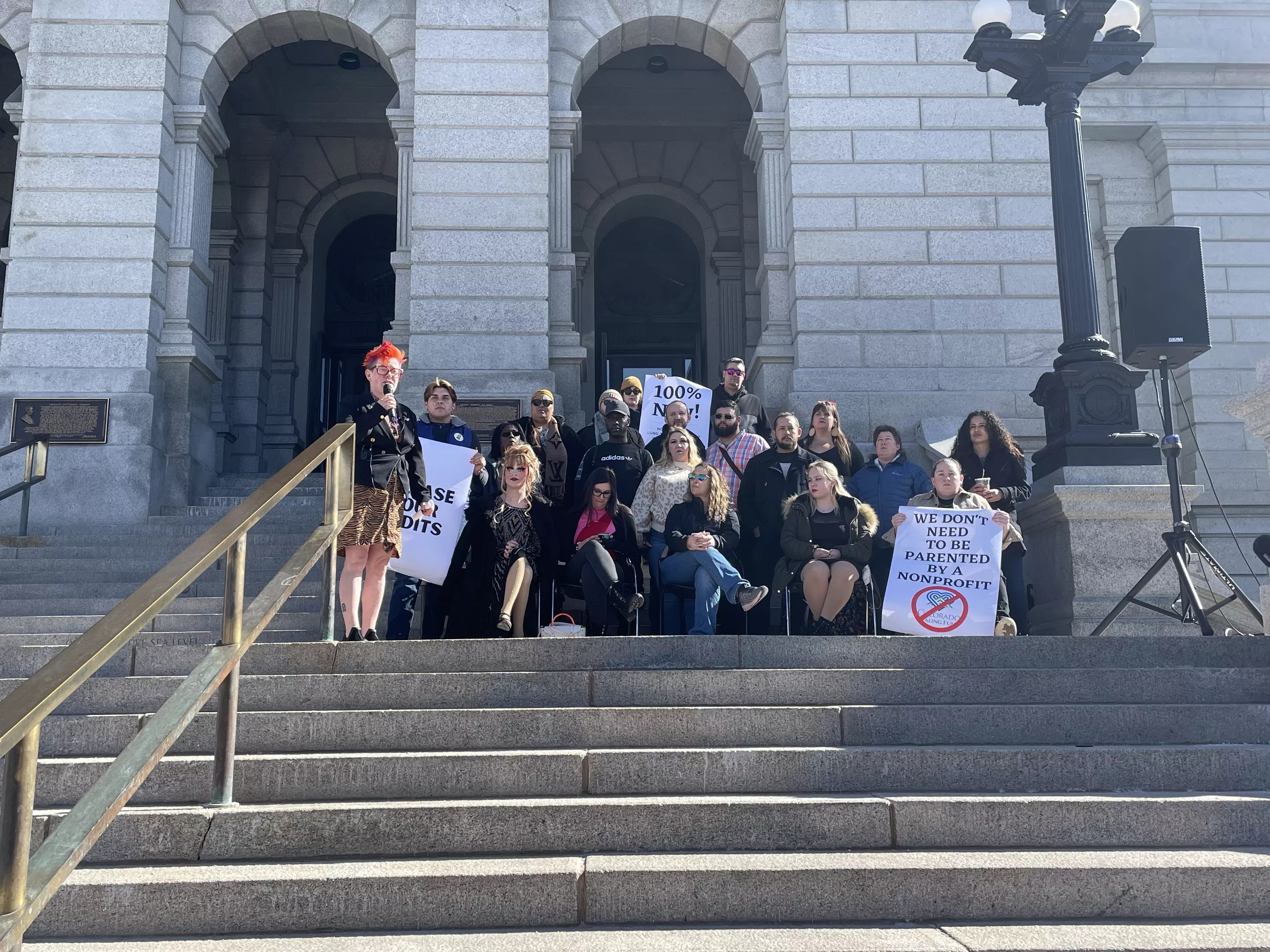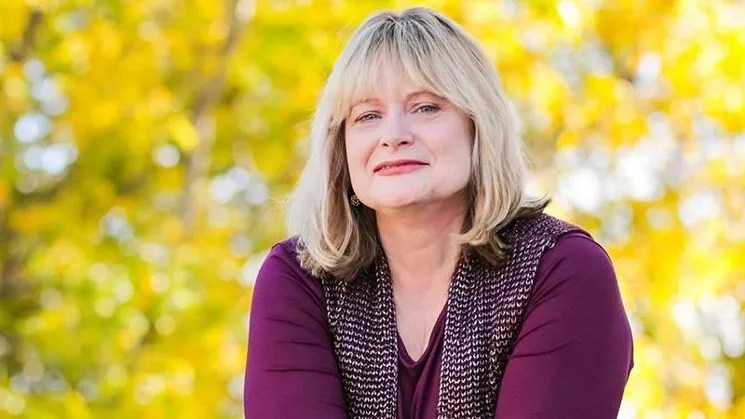
Catie Cheshire

Audio By Carbonatix
On June 26, just over six months after a shooter killed five people and injured seventeen others at the Club Q nightclub, the killer pleaded guilty to five counts of first-degree murder and 46 counts of attempted first-degree murder.
Club Q is a gay club in Colorado Springs, and Anderson Lee Aldrich also faced bias-motivated crimes charges; Aldrich pleaded no contest to those charges. There is still a federal investigation that could lead to hate-crime charges with a possible death sentence.
For now, Aldrich is serving five consecutive life sentences without the possibility of parole.
Adriana Vance is the mother of Raymond Green Vance, one of the five killed on November 19, 2022. She says that she’s glad the situation was resolved with a plea agreement rather than a trial, because now she can retrieve her son’s belongings.
And it’s not like any court process could fix what Aldrich did, she notes: “At the end of the day, it still doesn’t bring my son home.”
John Arcediano, a bartender who was working at Club Q that night, agrees. Despite the sentence, there was no formal apology from Aldrich or real closure for those impacted. “That was the overall, general consensus that most of the survivors got,” Arcediano continues. “It was just not the ending we were all looking for, the ending that we expected.”
Both Vance and Arcediano addressed the shooter in court on June 26.
“I wanted him to hear my voice,” Arcediano says. “One of the statements I said was, ‘Mr. Anderson, just know that you have not won. This has made me want to be stronger, prouder and louder as a person in the LGBTQIA+ community.'”
But the plea isn’t the end for everyone who was affected, Arcediano acknowledges. They still need to process their traumas and heal. And as they do that, they’re still pushing the Colorado Healing Fund to release money collected for them after the shooting.
The Healing Fund is a nonprofit organization kickstarted by the Colorado Attorney General’s Office when Cynthia Coffman – who is now CHF’s board chair – was attorney general. Starting in 2018, it’s been activitated after mass tragedies in the state to collect funds for the victims of mass shootings and then work with partner organizations to distribute them.
But survivors and family members of those who were killed in shootings ranging from the 2021 Boulder King Soopers shooting to the Club Q incident in November 2022 say that CHF’s process is invasive and overly cumbersome as they deal with the grief and trauma of these tragedies.
At first, Vance says, the help came quickly. She lives in Colorado Springs, and funds were immediately available to fly family members in from places like Mexico and Chicago to attend Raymond’s funeral.
Since then, however, she’s had a harder time accessing money that she really needs. Adriana and Raymond had split the rent at their Colorado Springs apartment, so she applied for rental assistance to cover her son’s half, as well as some of the wages she lost after missing work when her son was killed.
She says that because aid was delayed for months, she narrowly avoided an eviction notice.
“From my understanding, they were going to collect this money, they were going to disburse it to the people who needed it to be disbursed to, and we were going to move on,” she says. “Then it comes out that that’s not the case. They’re trying to find ways to keep the money; they’re raising fees, making you submit proof. I don’t understand that part.”
Late last year, CHF had caught flak for taking 10 percent of donations to cover administrative costs before an anonymous donor stepped up to cover those costs for the Club Q response.
Coffman points out that the paperwork survivors are required to file comes from the partner organizations with which CHF works to disburse funds. The documentation is important, she says, because CHF needs to make sure those claiming aid are actually victims, and the organization needs to properly account for what happens to each dollar.
In the case of Club Q, the partners are the Colorado Organization for Victim Assistance and the Community Health Partnership. And there were three or four people who claimed they were at Club Q that night but weren’t, Coffman notes.

Former Attorney General Cynthia Coffman pushed for the creation of the Colorado Healing Fund.
Facebook file photo
“We feel that it’s incumbent on us to do a good job of assuring that the money gets to the right people,” she says.
Vance and Arcediano agree with that principle; Vance says the CHF process was very secure. But for those who are really impacted, the requirement to divulge every aspect of their finances and prove they need what they need just doesn’t make sense, they add: They believe survivors and victims should simply be given the money and trusted to make the right choices about how it’s used.
“It’s like these people do not understand that everybody’s going through their own grieving process,” Vance says. “Then we have to be going to different locations, to go speak to different people, to talk about how these people are not giving us what we’re owed.”
Club Q victims have held multiple press conferences calling on CHF to release funds to them without further delay. The most recent was on June 20 at Colorado Springs City Hall, as rumors were flying that the shooter had taken a plea.
Three days later, CHF announced a new disbursement of $811,400 to Club Q victims. It had previously disbursed just over $2 million of the $3.2 million collected; it is now holding approximately $300,000 in reserve for intermediate and long-term needs for victims.
According to Coffman, the timing of the disbursement – coming right after the rally and right before the plea – was a coincidence. “It had been in the works for a period of time, and I’m happy that there’s a plea deal at the same time,” she says.
Arcediano says the $800,000 disbursement felt like a win, but that the $300,000 CHF is still holding on to seems excessive. And he doesn’t want to see any of those funds going to a resiliency center like the one created in Boulder after the King Soopers shooting.
Arcediano was hit with shrapnel during the Club Q shooting, but the deeper wounds are the mental ones he sustained from hearing screaming and seeing his friend Derrick Rump die. From the recent $800,000 disbursement, Arcediano will receive funds for lost wages as well as therapy, and money to help him relocate from Colorado Springs, where he says he no longer feels safe.
He’s the general manager of a Melting Pot in the Springs; he hopes to work at another location of the chain after he moves.
Survivors will receive checks from this latest disbursement early next week, according to Coffman.
Vance says the wait for money has been difficult. After the initial disbursement that helped family fly in for the funeral, about two months passed before she received help again.
“It’s a terrible experience,” she says. “To say that they want to collect money, accept donations for the families and the survivors, and then turn around and we have to pretty much beg for $1.”
She adds that she’s exhausted from the work she’s had to do to access money raised in her son’s name. “Regardless of how I feel emotionally, mentally, physically, I have to get up and leave my house to go and fight for something that is already supposed to be for us,” Vance says. “Because my son is not here anymore, he can’t go speak for himself. So I have to be the one to be his voice.”
Arcediano says he knows other Club Q survivors who are doing worse than he is mentally and financially, so even though advocating for the money is stressful, he wants to step up for others who need it.
The community the survivors have built together helps. They have a Facebook group and had a six-month reunion to mark the occasion “It’s been somewhat of a healing therapy for me to just be around other people that are going through this, just to be able to be connected with the people that my son was around in his last moments,” Vance says.
She will always remember Raymond as a great big brother who was kind and loving, wanting to help anyone who needed it. Although she’s found some of his spirit in the community of survivors, it’s been bittersweet, she says. She wishes she had met them for a different reason.
Vance advises anyone impacted by a mass tragedy to have someone close to them start a fund rather than rely on a system that could be slow or create a large accounting burden.
Coffman says that CHF will review the lessons learned when it ends its ongoing Club Q response.
“We’re going to do a debrief with our partners, with our board, the advisory group that assisted us in Colorado Springs, and walk through the things that happened and what we would do, if anything, differently,” she notes.
The money held in reserve will be used for ongoing needs related to emotional and mental health as well as any potential physical complications that could still arise, including housing adaptations precluded by certain injuries, she says.
Funds can also be used to bring families out for the anniversary of the shooting or important moments in the lives of those who were killed, such as birthdays. To access those funds, people need to request them through their community partner, whether that’s COVA or the Community Health Partnership.
Arcediano has learned that community counts most when tragedy strikes.
“I have changed immeasurably since I have started this journey,” he says. “It’s brought me closer to my community. It has made me stronger with my community. I have a better understanding and a better sense of what it is to be an LGBTQIA+ affiliate and somebody in the community. The pain will always be there. That will never change; that pain will always be there. But you need to keep moving even when it feels like you’re stuck in the same time, the same moment and the same place when it happened.”